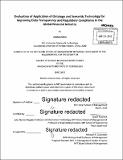| dc.contributor.advisor | Stuart Madnick. | en_US |
| dc.contributor.author | Chen, Jinchun, S.M. Massachusetts Institute of Technology | en_US |
| dc.contributor.other | Sloan School of Management. | en_US |
| dc.date.accessioned | 2015-09-29T18:58:39Z | |
| dc.date.available | 2015-09-29T18:58:39Z | |
| dc.date.copyright | 2015 | en_US |
| dc.date.issued | 2015 | en_US |
| dc.identifier.uri | http://hdl.handle.net/1721.1/99020 | |
| dc.description | Thesis: S.M. in Management Research, Massachusetts Institute of Technology, Sloan School of Management, 2015. | en_US |
| dc.description | Cataloged from PDF version of thesis. | en_US |
| dc.description | Includes bibliographical references (pages 78-79). | en_US |
| dc.description.abstract | In the global financial industry, there are increasing motivations for financial data standardization. The financial crisis in 2008 revealed the risk management issues, including risk data aggregation and risk exposure reporting, at many banks and financial institutions. After the crisis, the Dodd-Frank Act required transaction data of derivatives trades to be reported to Swap Data Repositories (SDRs). In addition, the Basel Committee on Banking Supervision (the Basel Committee) issued the Principles for effective risk data aggregation and risk reporting (BCBS 239) in January 2013. These new regulatory requirements aim to enhance financial institutions' data aggregation capabilities and risk management practices. Using ontology and semantic technology would be a plausible way to improve data transparency and meet regulatory compliance. The Office of Financial Research (OFR) has considered a project recommended by Financial Research Advisory Committee (FRAC) to explore the viability of a comprehensive ontology for solving existing data challenges, such as the Financial Industry Business Ontology (FIBO). FIBO, which could be a credible solution, is an abstract ontology for data that is intended to allow firms to explain the semantics of their data in a standard way, which could permit the automated translation of data from one local standard to another. This thesis studies the new regulatory requirements, analyzes the challenges of implementing these regulations, proposes a possible solution, and evaluates the application of semantic technology and FIBO with a use case. The thesis tries to explain how semantic technology and FIBO could be implemented and how they could be beneficial to risk data management in the financial industry. | en_US |
| dc.description.statementofresponsibility | by Jinchun Chen. | en_US |
| dc.format.extent | 79 pages | en_US |
| dc.language.iso | eng | en_US |
| dc.publisher | Massachusetts Institute of Technology | en_US |
| dc.rights | M.I.T. theses are protected by copyright. They may be viewed from this source for any purpose, but reproduction or distribution in any format is prohibited without written permission. See provided URL for inquiries about permission. | en_US |
| dc.rights.uri | http://dspace.mit.edu/handle/1721.1/7582 | en_US |
| dc.subject | Sloan School of Management. | en_US |
| dc.title | Evaluation of application of ontology and semantic technology for improving data transparency and regulatory compliance in the global financial industry | en_US |
| dc.type | Thesis | en_US |
| dc.description.degree | S.M. in Management Research | en_US |
| dc.contributor.department | Sloan School of Management | |
| dc.identifier.oclc | 921303300 | en_US |
